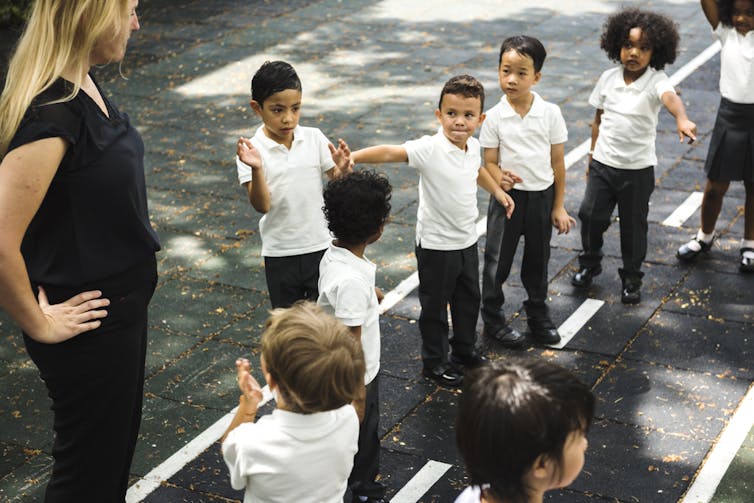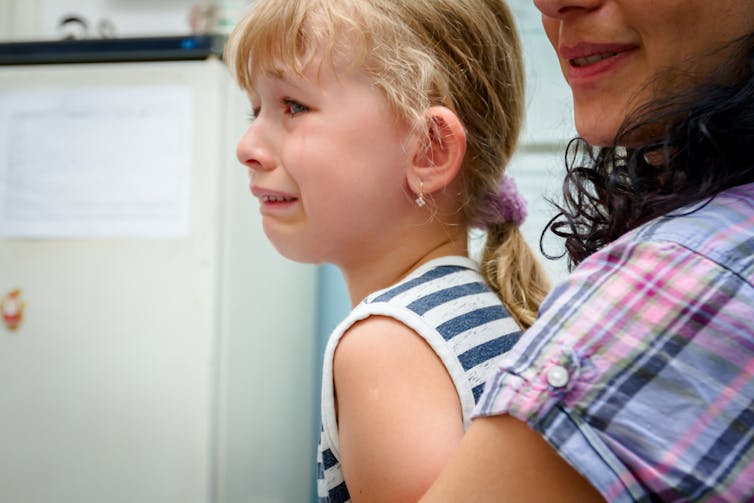
This piece is the first in a series that draws on the latest research on back to school transitions. In it, the experts explain how best to prepare children for school, and counter difficulties such as stress or bad behaviour.
There are so many ways to raise your children, and it seems more and more parents are trying to be gentle in their approaches. But this can be tricky once they hit school age. From about age five, children spend a significant amount of their time in school. In fact, Australian children spend the second most amount of time in primary education out of all OECD countries.
So, working out ways to align with the school system is vital to your children’s adaptation to this new place they’ll spend most of their time.
Early ways to get your child ready for prep
It’s widely acknowledged parents are a powerful force in a child’s school success. In many ways, the parents’ transition to school can be just as important as that of the child. So, it’s vital parents and children share a positive and enthusiastic attitude to school.
This attitude can be fostered in many ways. These ways include:
- reading books that associate positive feelings about school (see some good lists here and here)
- parents talking positively about their good times at school
- and even talking with siblings, cousins or others who are at school and enjoying their time there.
Researchers argue parents can assist by validating children’s nervous feelings about school and supporting them exploring these feelings.
Gentle ways to encourage positive associations with school
A study of children’s starting school coping strategies suggests children who develop positive relationships with teachers and other children are more likely to experience success.
So, parents can effectively manage their children’s relationships with schools in many positive ways. Keeping the lines of communication open, for parents, teachers and children, is vital to managing these interactions.
Read more:
How to avoid toxic disputes between parents and teachers
Similarly, a positive relationship between teacher and child is significant. Teacher-child closeness is positively associated with perceptions of good behaviour. And, if the child has a positive experience of kindergarten, they are more likely to engage positively at school, so relationships with kindergarten teachers are also vital.

Shutterstock
At the peer level, there’s a strong correlation between good peer relationships and children’s positive experiences of school. Parents can model good relationships with peers by having good relationships with friends as well as organising play dates that allow for positive peer interactions.
It’s probably unsurprising children who exhibit positive social-emotional development are likely to be successful at school. These children will demonstrate socially and culturally appropriate reactions to situations and will be able to manage their emotional reactions to stressful events.
At the personal level, there are several traits associated with positive transitions to school. Research suggests a child’s mindfulness can be helpful in managing transitions to school. Mindfulness for young children involves setting daily intentions and checking in with themselves to manage their emotions.
Many gentle parents practice open, non-judgemental and non-violent communication in their interactions with their children.
In addition, a child’s self-regulation is said to impact their success in transitioning to school. Self-regulatory behaviours include control over attention, inhibitions and working memory, and this is said to influence their health and well-being across the course of their lives.
This development can be seen in the temperaments of children who are best disposed to coping with school.

Shutterstock
Parents can help their children learn many skills that will help them transition successfully to school. For example, by encouraging children to stop, calm down and breathe through their feelings, parents can help their children be mindful of their feelings and manage those feelings. These behaviours are encouraged in gentle parenting literature.
Self-regulation can be promoted by helping children wait their turn for toys with siblings or play equipment with other children. Again, listening to and naming feelings the child is expressing can be helpful.
The encouragement of the temperaments associated with school success are important. Research suggests there is a correlation between the child’s stress reactions (do they explode or have a tantrum?) and inappropriate behaviour.
Positive temperaments can be fostered in a calm and cool classroom environment. They can also be fostered by parents’ following authoritative parenting practices. Authoritative parenting involves demanding excellence from your children, balanced with being highly responsive to their needs. Gentle parents are authoritative in their approach. For example, parents will give clear instructions, set boundaries, be warm and nurturing and encourage autonomy.
Read more:
‘Gentle parenting’ explainer: no rewards, no punishments, no misbehaving kids
What schools and teachers can do
There are many ways schools can gently encourage readiness. These strategies include the development of positive home-school relationships, which are very important to children’s happiness at school. Research suggests few schools have meaningful contact with parents, which is especially important at times of transition, especially from kindergarten to school.
A friend, whose son is about to start prep, noted how important simple things like a card and a photo of her son’s new teacher was in helping her child cope with the stress of “big school”. He has moved from being apprehensive, to seeing his teacher as a person encouraged by his mother who has used the picture to build an excitement about his upcoming experience.
![]()
Rebecca English does not work for, consult, own shares in or receive funding from any company or organization that would benefit from this article, and has disclosed no relevant affiliations beyond their academic appointment.
#asd #autismawareness #specialneeds #Inclusive #Iamunique #autism#employableme #Abundancecollege #supportdisability #community#autismawarenessaustralia #charity #nonprofit #brisbane #capalaba#neurodiverse #coloursforautism #neurodiversity #autismspectrumaustralia#cleveland #queensland #lovethis #employingautism #employablemeau#onthespectrum #transitiontowork #lifeskills #redlands #stepstosuccess ![]()
This is a syndicated post, which originally appeared at Education – The Conversation.View original post.
